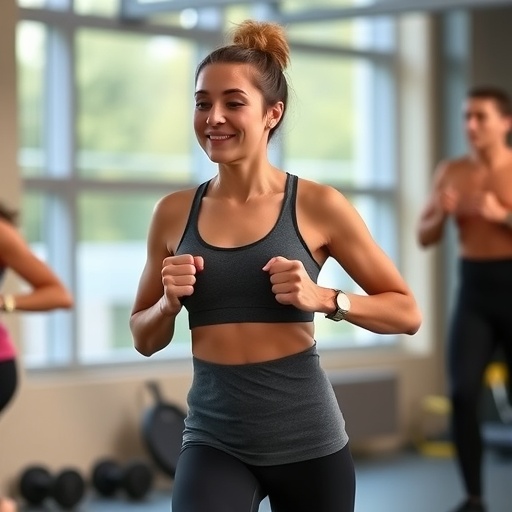In an era where sedentary lifestyles dominate much of the global population’s daily routine, finding practical and effective ways to enhance physical fitness has become a pressing health imperative. Recently, a synthesis of emerging research published in the British Journal of Sports Medicine has shed light on the promising concept of “exercise snacks”—brief, intentional bouts of physical activity designed to boost cardiorespiratory fitness, especially among physically inactive adults.
Exercise snacks encompass short durations of moderate to vigorous intensity physical activity lasting less than five minutes, excluding warm-up, cool-down, and recovery intervals. These bursts, repeated multiple times a day across several days per week, represent a novel approach to overcoming habitual barriers to exercise, notably the perceived lack of time and diminished motivation. Their compact nature suggests they could be seamlessly integrated into daily routines without the extended commitment typically associated with conventional exercise programs.
Globally, physical inactivity remains a significant health challenge, with approximately one-third of adults and a staggering 80% of teenagers not meeting the World Health Organization’s recommended minimums of 300 minutes of moderate or 75 to 150 minutes of vigorous physical activity weekly. This global inactivity surge underscores the urgent need for scalable interventions like exercise snacks that may disrupt sedentary behaviors and promote health without demanding substantial lifestyle overhauls.
Prior studies exploring the health benefits of exercise snacks have hinted at positive outcomes in counteracting the adverse metabolic and cardiovascular consequences associated with prolonged sitting. Common modalities highlighted include stair climbing, weight-bearing exercises, and functional movements. However, until now, most findings relied heavily on quasi-experimental or qualitative designs, limiting the robustness of conclusions regarding these interventions’ efficacy.
To address this critical gap, researchers executed a systematic review and meta-analysis, pooling data from 11 clinical trials conducted across Australia, Canada, China, and the United Kingdom. These trials collectively enrolled 414 sedentary or physically inactive adults, predominantly women, and investigated the impact of exercise snacks on fitness parameters, muscular endurance, and cardiometabolic markers over intervention periods ranging from four to twelve weeks.
The exercise routines incorporated represented a diverse range of physical activities tailored to age groups, with stair climbing dominating among younger and middle-aged participants, either performed in continuous bouts or intermittent intervals. Older adults were more inclined towards leg-focused resistance exercises and complex movement patterns such as tai chi, highlighting adaptability and customization of these interventions across the lifespan.
Analyzing the compiled data, the synthesis revealed a statistically significant enhancement in cardiorespiratory fitness among participants engaging in exercise snacks, affirming moderate certainty in the evidence supporting this benefit. Improved cardiorespiratory capacity is a cornerstone of reduced morbidity and mortality risk, emphasizing the clinical relevance of these brief, high-intensity efforts in promoting cardiovascular health.
Conversely, the impact of exercise snacks on muscular endurance, particularly within older adult cohorts aged 69 to 74, was inconclusive due to limited supporting data. Similarly, no significant changes were observed in leg strength, cardiometabolic parameters including body fat distribution, lipid profiles, or blood pressure. These findings suggest that while exercise snacks might potentiate cardiovascular fitness, their influence on other physiological domains requires further elucidation.
Of particular note is the remarkably high adherence rate observed across the included trials, with compliance averaging 91%, and retention throughout the programs at 83%. These figures underscore the practical feasibility and user acceptance of exercise snacks, valuable attributes for real-world applicability, especially when interventions are unsupervised and rely heavily on individual motivation.
The researchers caution that their conclusions are tempered by methodological heterogeneity and the relatively small sample sizes of included studies, which may constrain the generalizability of the findings. Variability in study designs, intervention protocols, and participant demographics necessitates further large-scale randomized controlled trials to validate these preliminary yet encouraging outcomes.
Nonetheless, the study’s authors posit that exercise snacks represent a time-efficient strategy that could surmount two pervasive obstacles to regular physical activity: perceived lack of time and low motivation. By partitioning exercise into manageable, flexible segments automatically linked to daily behaviors, this approach invites sustainable lifestyle integration, potentially transforming public health paradigms around physical inactivity.
As the global community continues to grapple with the burden of sedentary living and its associated chronic diseases, exercise snacks offer a scientifically grounded, practical solution worth serious consideration. Their adaptability, minimal resource requirements, and proven efficacy in elevating cardiorespiratory fitness position them as a compelling addition to the armamentarium against physical inactivity.
Future research avenues will need to explore optimizing the frequency, intensity, and modalities of exercise snacks to amplify their benefits, as well as investigating synergistic effects with other lifestyle interventions. Furthermore, mechanistic studies dissecting physiological responses at the cellular and systemic levels will deepen our understanding of how these short activity bursts promote long-term health adaptations.
In summary, exercise snacks emerge from this meta-analytical evidence as a promising, accessible, and scalable intervention to enhance key fitness domains among adults who struggle with conventional physical activity programs. Integrating such practices into everyday life may not only improve individual health outcomes but also reduce the societal healthcare burden attributable to physical inactivity.
Subject of Research: People
Article Title: Effect of exercise snacks on fitness and cardiometabolic health in physically inactive individuals: systematic review and meta-analysis
News Publication Date: 7-Oct-2025
Web References: 10.1136/bjsports-2025-110027
Keywords: Physical exercise




